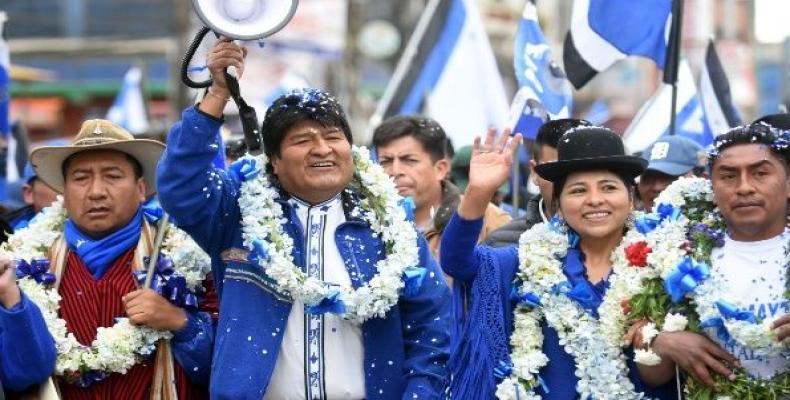La Paz, October 7 (RHC)-- Bolivia’s President Evo Morales has a 13.4 percent lead over his nearest rival, says a new poll published on Sunday by the CELAG think tank.
The poll gives Evo Morales 38.8 percent, just 1.2 percent short of a first-round victory in the upcoming October 20th elections. The survey also indicated majority support for the government’s nationalization of strategic industries and social programs for the poorest.
The poll gave second-place candidate Carlos Mesa 25.4 percent, and third place Oscar Ortiz 11.3 percent. This indicates that Morales is on course for a first-round victory, as under Bolivian law, only 40 percent is required if the candidate is at least 10 points ahead of their nearest rival.
Both Carlos Mesa and Oscar Ortiz are backed by right-wing forces in the country and have long criticized the country’s economic model under Morales’ period in office.
Mesa is a former President and Vicepresident who served during the neoliberal period pre-Morales era and presided over the privatization of natural resources, and the repression of protests against it.
Meanwhile, Ortiz, is backed by the right-wing parties dominant in the city of Santa Cruz, the same organizations that led the U.S.-backed ‘media luna’ coup in 2008 and 2009.
Both candidates will struggle against Morales who has maintained high general approval ratings during his 13 years in power. The poll indicates that 67 percent of voters think Morales has managed the country well since 2006, and 31.4 percent think he has done so badly.
Beyond the electoral candidates, the survey asked voters’ opinions on two key issues of the campaign, the question of nationalization of strategic industries, and the question of social programs for low-income families.
Since coming to power, Morales has nationalized the country's large natural gas reserves, along with other natural resources and strategic companies. There has also been a number of social programs launched and aimed at helping the most vulnerable sectors of the population.
Both policies have been heavily criticized by the right-wing opposition who label the measures as ‘populism’. However, both receive widespread approval.
On nationalization, 51 percent say that public ownership is positive for the economy, with 33.8 percent saying that it harms growth. On social programs, 61.7 percent say they are essential for providing dignity to those of low incomes, meanwhile 31.7 percent say they encourage laziness.
The issue of surveys and polls have become a contentious issue in Bolivia.
One outlier poll, published by a religious NGO and the UMSA University, gave Morales a lead of just 7 percent. However, that poll was ruled inadmissible by the country’s electoral authorities due to issues relating to its funding. It was later revealed that the U.S. government had funded that particular poll.


